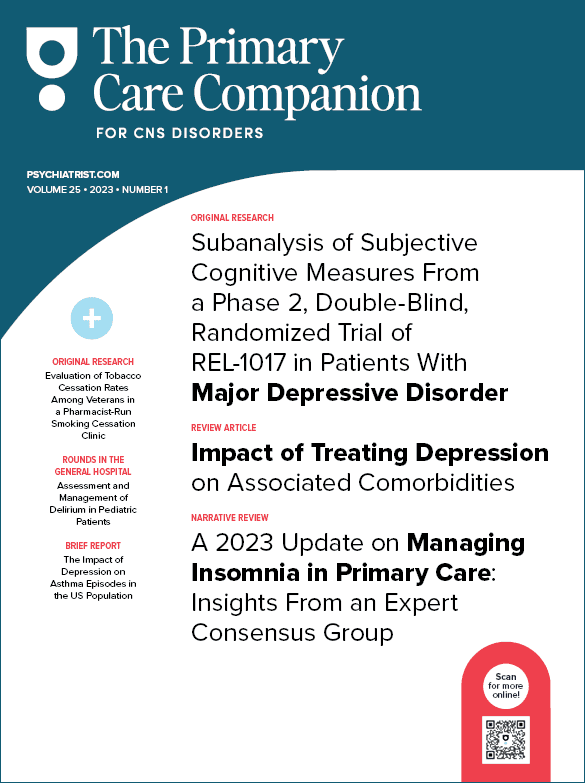Prim Care Companion CNS Disord 2023;25(3):22l03375
To cite: Gupta A. Varenicline use for cocaine dependence. Prim Care Companion CNS Disord. 2023;25(3):22l03375.
To share: https://doi.org/10.4088/PCC.22l03375
© 2023 Physicians Postgraduate Press, Inc.
aGovernment Medical College and Hospital, Chandigarh, India
*Corresponding author: Abhishek Gupta, MBBS, Government Medical College and Hospital, Sector 32, Chandigarh, 160047 India ([email protected]).
Cocaine addiction is an important public health issue worldwide and has severe costs for both the individual and society at large. Cocaine is a psychoactive substance that causes its so-called high by the buildup of dopamine in the brain centers, especially the limbic system, which is the center for regulating pleasure and motivation.1 Although the effects of cocaine make it an addictive substance, half of a person’s risk of addiction has been found to be genetic,2,3 but the genes responsible have yet to be determined. To date, most medications for cocaine addiction have focused more on suppressing its effects, including the cocaine “vaccines.”1
Varenicline was approved by the US Food and Drug Administration (FDA) in 2006 for the treatment of nicotine dependence. It has shown efficacy as a treatment for smoking cessation4,5 and prevention of relapse.6,7 Varenicline is a partial agonist at the α4β2 nicotinic acetylcholine (ACh) receptors8 and a full agonist at the α7 nicotinic receptor.4,5 The α4β2 nicotinic ACh receptors facilitate the dopamine-releasing effects of nicotine in the nucleus accumbens, a key component of the reward circuit4 in the limbic area of the brain. These outcomes led researchers to postulate that the drug might be helpful in the treatment of cocaine addiction.1 Varenicline, as suggested by evidence, also acts as a partial agonist at α6b2* nicotinic ACh receptors in both rat and monkey striatal synaptosomes.9 The importance of α6b2* nicotinic ACh receptors in regulating dopamine release is increasingly acknowledged.10
To date, a few trials have been conducted to assess the efficacy of varenicline in cocaine dependence with mixed results. These studies had limitations, which the authors highlighted, but none were large-scale studies with hundreds of participants; hence, the evidence should be taken with a grain of salt.
A pilot study conducted in 2010 by Poling et al11 found no significant differences in the efficacy of varenicline in reducing cocaine use compared to placebo in patients on methadone maintenance and at the time smoking nicotine. The study had a small sample size of 31 participants, which the authors11 mentioned as a limitation. In contrast, Plebani and colleagues12 in 2012 demonstrated opposite findings, as they suggested a small to moderate efficacy of varenicline in cocaine dependence. They also measured cocaine reinforcement with the use of varenicline, which showed a significant improvement compared to placebo. However, their study12 also had a major limitation of a small sample size of only 37 participants.
An animal study10 conducted in 2014 with 6 rhesus monkeys assessed the effects of chronic varenicline treatment on self-administered nicotine, cocaine, and nicotine and cocaine combined. The results showed that varenicline had no effect on cocaine alone self-administration, but the nicotine alone group and high-dose nicotine with cocaine group showed a statistically significant decrease in self-administration. The finding that varenicline did not decrease cocaine use was in accordance with that of Polling et al11 in human participants and in an animal study13 conducted in 2011.
A recently published 12-week, double-blind, placebo-controlled study14 of 156 subjects with cocaine dependence receiving varenicline showed little difference in cocaine craving and abstinence in the participants, which indicates that varenicline might not be as effective for treating cocaine dependence as it is in the treatment of nicotine dependence. None of the studies referenced here reported any side effects of varenicline, and all stated it was well tolerated.
Varenicline is an FDA-approved drug for the treatment of nicotine dependence. It has been shown to be well tolerated and efficacious in nicotine-dependent patients. But the results of clinical trials and preclinical trials to date on cocaine dependence are mixed. Most of the studies show a nonsignificant difference in the efficacy of varenicline, with few demonstrating that it can be a viable option. Studies in rhesus monkeys suggest that it might be useful for smokers with low-dose cocaine dependence, but none outright prove its efficacy. No large, controlled trial exists to date, and until one is conducted, varenicline should be used with caution in cocaine-dependent patients.
Published online: May 30, 2023.
Relevant financial relationships: None.
Funding/support: None.
References (14)

- Nestler EJ. The neurobiology of cocaine addiction. Sci Pract Perspect. 2005;3(1):4–10. PubMed CrossRef
- Goldstein A. Addiction: From Biology to Drug Policy. 2nd ed. Cary, NC: Oxford University Press; 2010.
- Nestler EJ, Malenka RC. The addicted brain. Sci Am. 2004;290(3):78–85. PubMed CrossRef
- Oncken C, Gonzales D, Nides M, et al. Efficacy and safety of the novel selective nicotinic acetylcholine receptor partial agonist, varenicline, for smoking cessation. Arch Intern Med. 2006;166(15):1571–1577. PubMed CrossRef
- Nides M, Oncken C, Gonzales D, et al. Smoking cessation with varenicline, a selective alpha4beta2 nicotinic receptor partial agonist: results from a 7-week, randomized, placebo- and bupropion-controlled trial with 1-year follow-up. Arch Intern Med. 2006;166(15):1561–1568. PubMed CrossRef
- Tonstad S, Tønnesen P, Hajek P, et al; Varenicline Phase 3 Study Group. Effect of maintenance therapy with varenicline on smoking cessation: a randomized controlled trial. JAMA. 2006;296(1):64–71. PubMed CrossRef
- Coe JW, Brooks PR, Vetelino MG, et al. Varenicline: an alpha4beta2 nicotinic receptor partial agonist for smoking cessation. J Med Chem. 2005;48(10):3474–3477. PubMed CrossRef
- Mihalak KB, Carroll FI, Luetje CW. Varenicline is a partial agonist at alpha4beta2 and a full agonist at alpha7 neuronal nicotinic receptors. Mol Pharmacol. 2006;70(3):801–805. PubMed CrossRef
- Bordia T, Hrachova M, Chin M, et al. Varenicline is a potent partial agonist at α6β2* nicotinic acetylcholine receptors in rat and monkey striatum. J Pharmacol Exp Ther. 2012;342(2):327–334. PubMed CrossRef
- Mello NK, Fivel PA, Kohut SJ, et al. Effects of chronic varenicline treatment on nicotine, cocaine, and concurrent nicotine+cocaine self-administration. Neuropsychopharmacology. 2014;39(5):1222–1231. PubMed CrossRef
- Poling J, Rounsaville B, Gonsai K, et al. The safety and efficacy of varenicline in cocaine using smokers maintained on methadone: a pilot study. Am J Addict. 2010;19(5):401–408. PubMed CrossRef
- Plebani JG, Lynch KG, Yu Q, et al. Results of an initial clinical trial of varenicline for the treatment of cocaine dependence. Drug Alcohol Depend. 2012;121(1-2):163–166. PubMed CrossRef
- Gould RW, Czoty PW, Nader SH, et al. Effects of varenicline on the reinforcing and discriminative stimulus effects of cocaine in rhesus monkeys. J Pharmacol Exp Ther. 2011;339(2):678–686. PubMed CrossRef
- Lynch KG, Plebani J, Spratt K, et al. Varenicline for the treatment of cocaine dependence. J Addict Med. 2022;16(2):157–163. PubMed CrossRef
Enjoy free PDF downloads as part of your membership!
Save
Cite
Advertisement
GAM ID: sidebar-top




